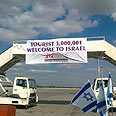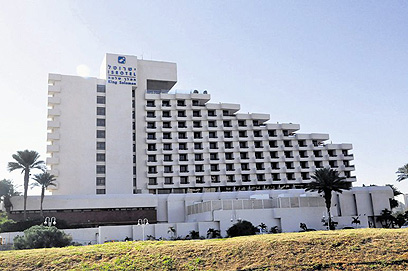
'Tourism Ministry figures groundless'
While ministry reports record year for incoming tourism, Israel Hotel Association says numbers present entries to Bethlehem and Jordan as well
In a press conference held in Tel Aviv last week, the Israel Hotel Association (IHA) presented its annual summary of the past year in tourism and its forecast for the coming year.
IHA officials were not dazzled by the tourist entry figures presented by the Tourism Ministry last week, arguing that the real numbers were much lower. IHA Vice President Rafi Farber said it was wrong to view Ben-Gurion Airport as tourists' front gate to the State of Israel alone.
"From Ben-Gurion they also go to Bethlehem, Jordan, and in good times – to Egypt as well," he noted. "Therefore, the Tourism Ministry's figures are groundless."

Lack of hotel rooms in Israel (Photo: Yossi Dos-Santos)
Farber added that the Ministry's plan to bring five million tourists a year to Israel by 2015 was unachievable due to the major lack of hotel rooms and the fact that hardly any large hotels had been built in the country since 2000.
'No hotels – no tourism'
A total of NIS 40 billion (about $10.7 billion) is invested in the hotel industry every year, and according to IHA President Ami Federman, "Without hotels there is no tourism."
New hotels could contribute NIS 180 million ($48 million) to the GDP in five years, he added.
Addressing the tourism industry in light of the upcoming elections, Federman said that "people are making political statements to the world before the elections, but that doesn't help tourism."
The new year is expected to bring a 10% drop in tourist stays and a loss of NIS 500 million ($135 million) in hotel income. In total, the tourism industry is expected to suffer NIS 1.8 billion ($480 million) in losses due to the ongoing impact of November 2012's Operation Pillar of Defense.
"In Operation Pillar of Defense, our most important asset was confiscated – the State's tourist image," he adds. "For us, it's like water for agriculture. Without a good image there can be no tourism."
He said the expected drop in tourism in the coming year could result in the dismissal of some 2,000 workers.
According to Federman, the tourist industry must be rehabilitated just like a farmer who has lost his crop. He called Prime Minister Benjamin Netanyahu to allot NIS 100 million ($27 million), immediately, to an aggressive marketing campaign in the United States, Russia, France and Germany, in a bid to bring tourists back.
Federman also called on the future tourism minister to lead a national move aimed at utilizing the tourism industry's economic and social potential to the fullest, and to implement the government's decision to reduce hotels' operation costs and ease the regulatory burden.
In light of the rise in the number of tourists visiting Israel, Federman demanded that the government made tourism its top priority as an economic development model, just like heads of state are doing worldwide.
'Tel Aviv hotels expensive'
Federman admitted that hotel prices in Tel Aviv were high, but said they were not among the highest in Europe and that it comparing between one product and another was difficult.
"Tel Aviv is a good tourism city but it falls short in rooms, and that definitely contributes to the high prices," he said.
According to IHA figures presented at the conference, hotel prices will remain high in the coming year due to the rise in the cost of electricity, water and property tax, and an additional expense of NIS 70 million ($18 million) aimed at adjusting hotels across the country to the accessibility law.
2012 summary
Number of overnight stays in hotels: 22.1 million (up 1% from 2011)
Tourist stays: 9.7 million (down 3% following Operation Pillar of Defense)
Israelis' stays: 12.4 million (up 4% from 2011)
Main destinations for incoming tourists: Jerusalem (31% of tourist stays), Tel Aviv (23%), Tiberias and the Sea of Galilee area (10%), Eilat (9%), the Dead Sea (6%).
Main destination for Israeli tourists: Eilat (47%), the Dead Sea (13%), Tiberias and the Sea of Galilee area (10%), Jerusalem (6%).
Average room occupancy in 2012: 66%
Number of hotel rooms: 48,000. Some 400 rooms added to hotels across Israel this year
Danny Sadeh contributed to this report










